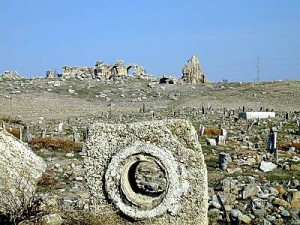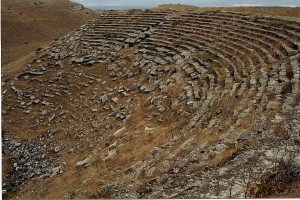Reflections on a Pauline Pilgrimage to Turkey [7]
“And to the angel of the church in Laodicea write: The words of the Amen, the faithful and true witness, the origin of God’s creation: ‘I know your works; you are neither cold nor hot. I wish that you were either cold or hot. So, because you are lukewarm, and neither cold nor hot, I am about to spit you out of my mouth. For you say, ‘I am rich, I have prospered, and I need nothing.’ You do not realize that you are wretched, pitiable, poor, blind, and naked; I counsel you to buy from me gold refined by fire, that you may become rich; and white garments, that you may clothe yourself, and that the shame of your nakedness may not be revealed; and eye salve to anoint your eyes, that you may see.’” [Revelation 3:14-18]
[1] Ruins from ancient Laodicea, including a section of the aqueduct.[2] Laodicea Theatre [3] Pamukkale hot springs.
It is not easy to visit the biblical city of Laodicea and not walk away with disturbing images that linger obstinately.
What do you do when a congregation gets materially rich but spiritually empty, affluent but religiously indifferent, successful but allowing success to get to their heads? Today, wherever we may be located as a church, it may be easy to feel implicated by some such negative assessments. Two thousand years ago, the Lord had strong words for exactly such a faith community in Laodicea, one of the seven churches most severely criticized by Christ in the Book of Revelation.
Of the several cities named Laodicea in Syria and Asia Minor, only one is mentioned in the Scriptures. This is the city in the fertile Lycus Valley of the province of Phrygia. About 40 miles east of Ephesus and 10 miles west of Colossae, Laodicea was built on the banks of the river Lycus, a tributary of the Maeander River. Successively called Diosopolis and Rhoas, it was later named Laodicea in honor of Laodice, the wife of Antiochus II (261-246 B.C.), who rebuilt it. It was one of the most important and flourishing cities of Asia Minor. Early in the Jesus movement, it became one of its key centres (Col. 2:1; 4:3-16; Rev. 1:11). Today, it is nothing more than a heap of ruins, called by the Turks Eski-hissar, or “old castle”. Even this “heap” is not much to look at, since blocks of stones had been transported away and recycled in other building projects. An impressive exception is the amphitheatre, measuring some 355 metres wide and 65 metres tall. What’s left of it still teases one’s imagination of its former grandeur and of the ancient city’s affluence and cultured lifestyle.
In Paul’s time, the Christian community in Laodicea seemed to have been connected with that of nearby Colossae. Laodicea is mentioned five times in the Epistle to the Colossians. This suggests a Christian presence in Laodicea as early as the AD 50’s. A sizeable presence of Jews in this city probably accounted for the planting here of a church at so early a date. Laodicea, like Colossae, was not evangelized by Paul, but possibly by his disciples Epaphras and Philemon, both of whom came from Colossae, during his time in Ephesus. It appears from the epistle to the Colossians (Col 4:15-16) that Paul never visited Laodicea, but hearing probably from Epaphras of the false doctrines spread in that city, he wrote an epistle to the Colossians intending that it be read in Laodicea as well.
Christians will always find a visit to Laodicea yielding striking images and ironies when they combine the geography, the social situation of the time, and the biblical metaphors. In John’s vision, recorded in the book of Revelation, the message Christ instructs him to write to the church of Laodicea is one of judgement with a call to repentance (Rev 3:14-22). The oracle of awful warning contains a number of striking metaphors, four of which were particularly meaningful during our trip.
1. Wretched
Laodicea sat on a busy trade route from East to West and local businessmen had become very well to do. After the earthquake in AD 60 that devastated many Asian cities, only Laodicea refused to accept Roman financial assistance because she was so wealthy. This attitude of material self-sufficiency – ‘I am rich, I have prospered, and I need nothing’ – had crept into the church as well.
The banking and money exchange industry having thrived in the city, the message was ironic in judging the reality of the city as “poor”. The Laodiceans might be rich materially, but the Lord saw through their arrogance and pronounced their spiritual bankruptcy, calling them “wretched”, “pitiable” and “poor” spiritually.
2. Lukewarm
In their life of faith, the Laodiceans were lukewarm, and neither hot nor cold. Christians who fit that description are nauseating to the Lord who would vomit them out of his mouth. Being described as “lukewarm” is being criticized for one’s neutrality or lack of zeal or commitment – neither here nor there, neither this nor that. To be lukewarm is to be spiritually indifferent. The term Laodicean has thus taken on a pejorative sense in the English language to refer to those neutral or indifferent in matters of faith.
It is quite amazing how this metaphor is actually reflected in the water supply of the city, which was lukewarm, in contrast to the hot springs at nearby Hierapolis and the pure water of Colossae. Water from hot mineral springs some five miles south would have become tepid before entering the city.
3. Blind
The Lord said of the proud Laodiceans that they did not realize they were in fact “blind”. He exhorted them to buy eye salve to anoint their eyes, that they might see.
The Laodicean church’s spiritual blindness was ironic because, situated within the boundaries of ancient Phrygia, the city was well supplied with an ingredient of eye-lotions known as “Phrygian powder”. Its medical school had helped in the development of a medical industry and, with its faculty of ophthalmology, even produced a famous salve for treating eye disease.
4. Naked
Shockingly, the Lord also judged the well-cultured Laodiceans “naked”, and exhorted them to buy “white garments” to cover their shameful nakedness. White garments symbolize faith and commitment. This exhortation clearly directs the Laodicean Christians to not only tell about their faith, but to proportionately show their faith in their daily life. Unless they did that, they would be empty vessels, lacking in substance, and quite “naked” indeed spiritually.
This metaphor is again ironic, for the believers were living in a city famous for its garment industry that manufactured clothing from the famous black wool of the region.
5. Listen
The words ‘I am rich, I have prospered, and I need nothing’ attributed to the Laodiceans may, some scholars suggest, mark an ironic over-confidence in regard to spiritual wealth and a failure to recognise their bankruptcy. More probably, the image was drawn from the worldly wealth of the city. The point is, all this led to a spiritual arrogance that resulted in an inability to hear God’s message.
So in his message to the church of Laodicea, Christ exhorted them to listen and in doing so he gave one of the most beautiful imageries in the entire Bible – “Behold, I stand at the door and knock!”
- “Behold, I stand at the door and knock. If anyone hears my voice and opens the door, then I will come in to him, and will dine with him, and he with me” [Rev 3:20].
What about ourselves?
These striking images involving the ancient church in Laodicea have much to inform and instruct us on our Christian living today.
[a] A call to remember
First, they speak to us about the difference between material wealth and spiritual richness. The Lord, to be sure, does not criticize the fact that we are rich. What the Lord does detest, it seems clear, is when Christians are being materially rich but spiritually poor at the same time. This happens when Christians are arrogant on account of their worldly wealth or of their positions in church and society. The Laodicean story warns us that the wealthy and the high-positioned are at great risk of picking up the Laodicean mantra: “’I am rich, I have prospered, and I need nothing.”
As the Lord warns us of our forgetfulness of where we came from, the five words he uses to pinpoint our spiritual bankruptcy – wretched, pitiable, poor, blind, and naked – serve as a call to remember. These words are shocking to our system. Just when we think we are doing well where we are, basking in high and mighty holy blessedness, the powerful and prophetic words of the Book of Revelation throw down the earth-shattering judgment that we are in fact living in the dump!
This reminds us of an encouraging story. Unseen by the Sunday congregation, an American priest who has picked up a reputation as a good preacher makes it a point to take off his well-polished leather shoes and pushes them under the lectern when he preaches the homily. This is a priest who, in view of the trappings of success, knows the temptation of forgetfulness, and consciously desires not only to remember the humble origin he comes from, but also to be aware that he is preaching the Word of the Suffering Servant of God.
And just in case the “rest” of us Christians who think we are off the hook because, after all, we are neither listed amongst the rich and famous nor among the high-positioned in church or in society, listen to this.
In the early 90’s, Professor Raymond F. Collins taught us various New Testament studies at the Catholic University in Louvain, Belgium. On one particularly chilly morning, he walked into the lecture hall, put his old and well-worn leather case on the table and, before he took off on the biblical lecture of the day, said something to us about wealth which left a lasting impression on the class. Casting a broad sweep across the lecture room, he said:
- “I can see that you have a roof over your head, that you have a change of clothes, and that you have some meals a day. And, despite this weather, you have the opportunity to come and study theology in this venerable institution of critical learning. I say you are rich.”
It was more than a minor awakening to a class of generally “poor” first-cycle theology students. It also serves us well to not ever forget that the scientific study of theology is quite futile without a heavy dose of reality-checks in life implications.
Standing at the heap of ruins and reading God’s message to the church in Laodicea, where the Lord took issue with those who held themselves up as being rich, we instinctively realised that the message was not just meant for the Laodiceans of old, but for this bunch of “wretched” and “pitiable” pilgrims as well, just as it is meant as the living word of the living God to Christians wherever they may be!
[b] A call to listen and contemplate
The church of Laodicea is sharply criticized for being lukewarm. As its wealth hid its spiritual poverty, and its arrogance impaired its ability to listen to the Word, so are we shaken from our relative ease and amnesia and called to listen. To be sure, this call to listen, is a call to contemplation. What do we hear? What do we see?
The Laodicean condition describes the spiritual lukewarmness and worldliness that will prevail in the professing church of Christ at the end of the age. Rich, cultured, religiously ritualistic – this church will have become so self-satisfied and worldly as to have ostracised Christ completely.
This cuts a scary picture.
Has the spiritual condition of the corporate body become so awful and so utterly abhorrent to God, that it has sunk to a level where Christ is no longer admitted? Is Christ now standing outside and extending invitations to individual spiritually-indifferent “believers” to a true communion with Him, just as much as He is extending that invitation to a spiritually-unfaithful church?
Just as the awful warning bears similarities to a saying of Jesus on being ready for the Master’s return [Mark 13:33–37; Luke 12:35–38], so too, the theme of divine invitations reminds us of the Parable of the Wedding Feast [Matthew 22:1-14]. Commentators variously view it as a metaphor of intimate fellowship, and/or a reference to the eschatological parousia of Christ.
This metaphor of Christ knocking at the door of the Laodicean Church is captured on canvas by William Holman Hunt in his famous 1854 piece – The Light of the World. The door has no outside doorknob; it must be opened from the inside. The door is overgrown with creepers, signifying its extended lack of use. So Christ the King, the Light of the world, is kept standing outside, in the night, in the cold. The King suffers, his crown made of thorns. He stands patiently and knocks, bringing the light, chasing away darkness. He is kept at bay, yet he offers grace, and awaits our response. “If any one hears me and invites me in…”
Grace Incarnate, the Light of the World, knocks ever so gently at the door of our hearts, calling us to listen, to contemplate him in the silence of our hearts. Can we listen? Do we hear? Will we open our hearts to let him in?
By the way
A trip to Laodicea will always include a sight-seeing visit to Pamukkale and the ancient city of Hierapolis ten kilometers away. Pamukkale means “cotton castle” in Turkish, while the ancient Greco-Roman and Byzantine city of Hierapolis was built on top of the white “castle”. This UNESCO World Heritage site features hot springs, white cliffs visible from a distance, and travertines, which are terraces of carbonate minerals left by the flowing water.
Visitors use the hot spring baths or just walk bare-footed on shallow hot spring water. But, the whole place is extremely slippery and seriously perilous. We saw a few people slipped and fell, perhaps only hurting themselves slightly, but certainly getting themselves soaking wet – not an ideal condition to continue one’s journey in. Caution is therefore the key. And, a gentle word to the elderly: perhaps it’s best to just sit at the side and enjoy the view. Don’t go in there!
Copyright © Dr. Jeffrey & Angie Goh, September, 2011. All rights reserved.
You are most welcome to respond to this post. Email your comments to us at jeffangiegoh@gmail.com. You can also be dialogue partners in this Ephphatha Coffee-Corner Ministry by sending us questions for discussion.



